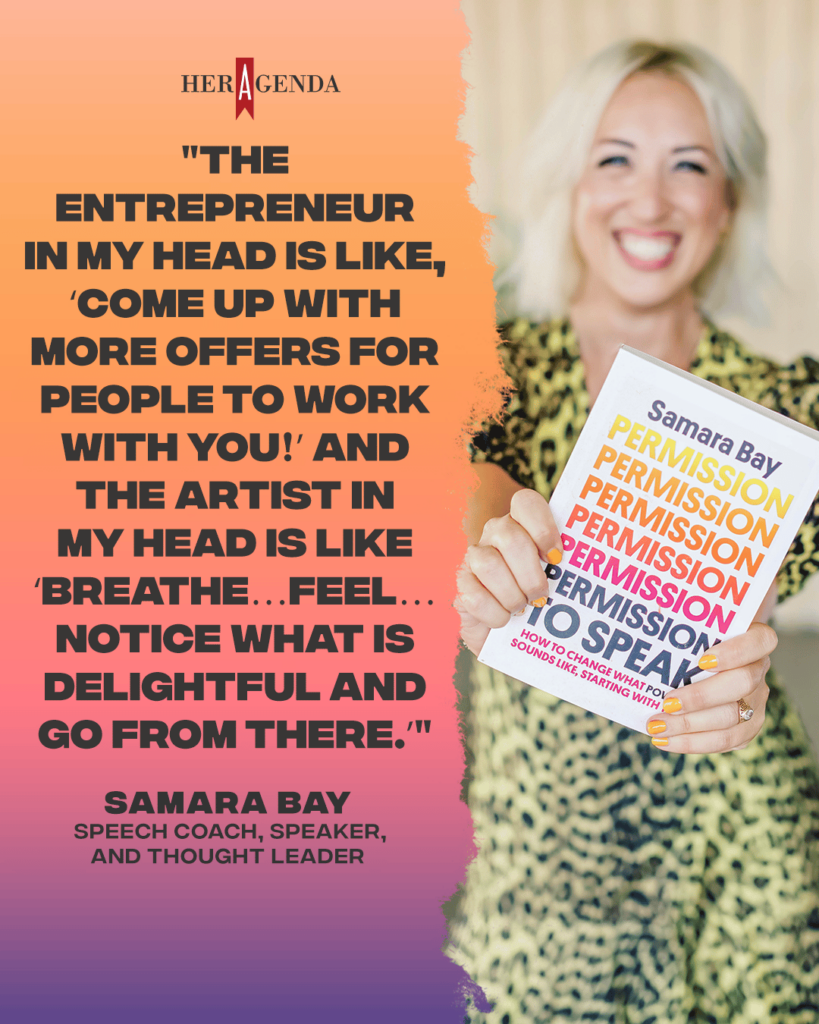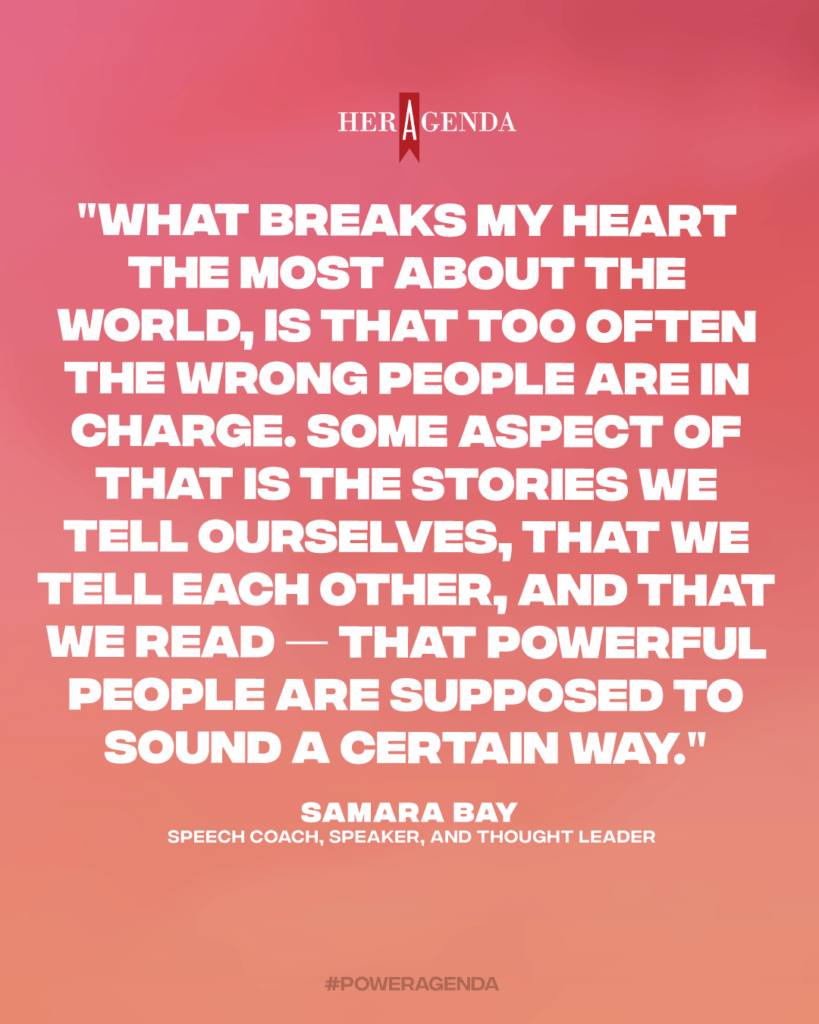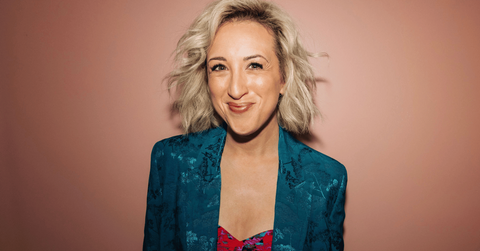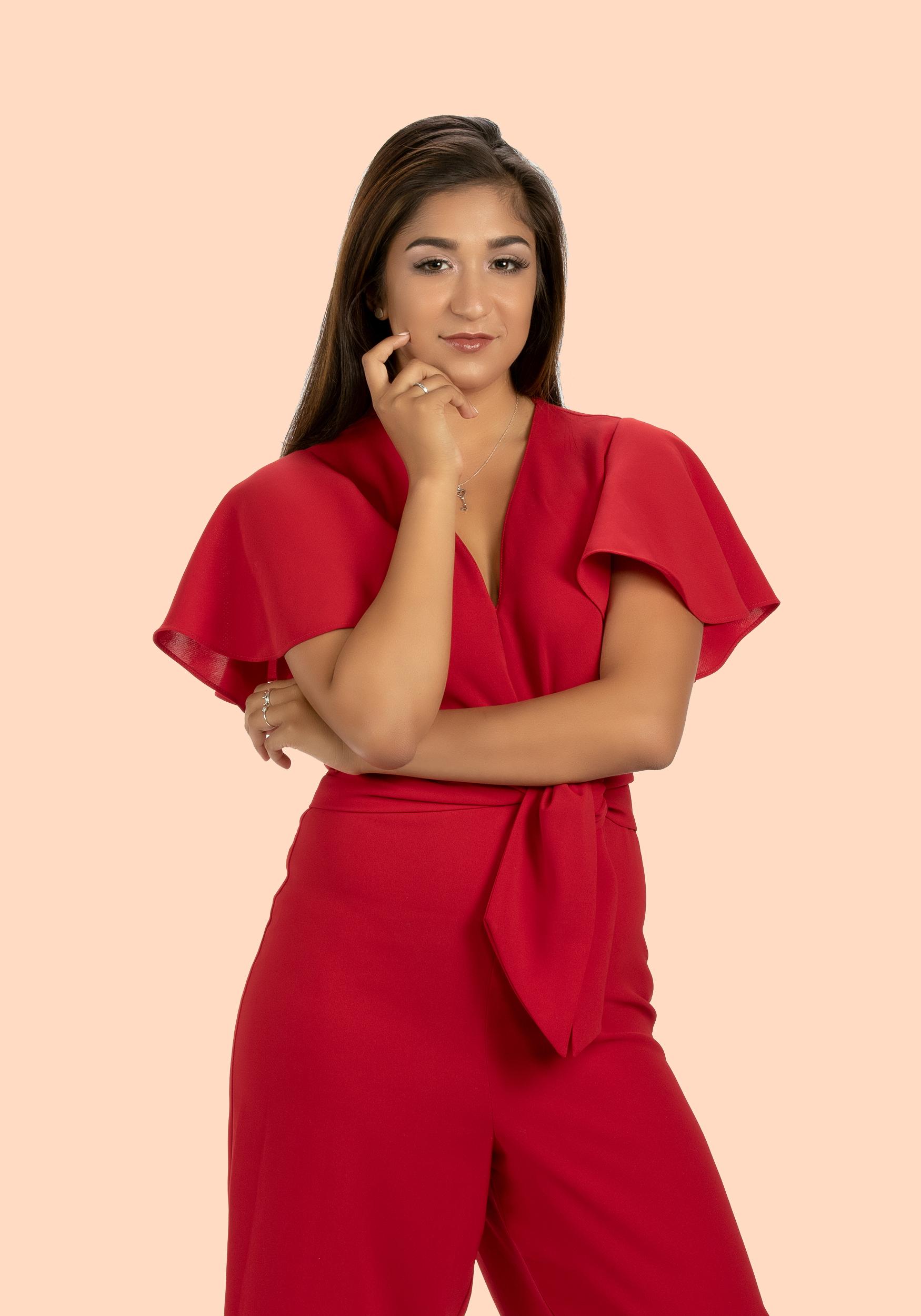We are all born with a voice story according to dialect coach, Samara Bay. She is a highly sought-after speech coach, speaker, and thought leader whose clients span Hollywood celebrities, political powerhouses, and leaders in business. She has had clients such as Rachel McAdams, been interviewed by Deepak Chopra, and worked on blockbusters such as Wonder Woman and Guardians of the Galaxy. For her, voice is the vehicle to speak with confidence and joy, and in her words, “truly make sh*t happen.”
Samara is the 2023 bestselling author of Permission to Speak: How to Change What Power Sounds Like, Starting With You from Penguin Random House. Her work has been featured in The New York Times Magazine, TIME, CBS Sunday Morning, Tamron Hall, Fast Company, Glamour, and Entrepreneur Magazine.
She is all about the new sound of power, whether that means speaking and running global masterclasses at Google, Telemundo, How To Academy, or The Tory Burch Foundation. Samara is a resilient mentor to young high school activists at groups such as DemocaSHE, and she embodies the use of voice to get what you want. Before teaching others how to step into power, Samara leans into the technical — teaching one to understand their breath, pitch, tone, volume, and pace. When her clients come into this understanding her work then shifts to permission. The permission to capture the power that is already within.

Her Agenda: In your book, Permission To Speak, you tell us everyone has a voice story. Can you describe yours?
Samara Bay: It’s important to note that your voice story is not only one thing. A voice story is a billion little half-truths or myths that you uncover at the moment as it happens. For example, I was brought in to coach a really high-powered politician who at the end of our session snapped his hands and went, ‘I know who you remind me of! Rachel Maddow!’ I thought, oh, wow, that guy only has one archetype for a strong woman who knows how to speak on her own conviction, because Rachel Maddow and I don’t have a huge amount in common. Then I thought a little deeper.
She and I actually grew up about half an hour away from each other. In certain ways, we went through an academic process by which we had to learn how to speak in complicated sentences and put a period on our thoughts in order to get taken seriously. That’s an example of unpacking a moment where I got a comment and I could either resist it or I could have gotten curious. In what way is this actually revealing some aspect of my voice story? The way that Rachel presents herself on camera does actually bear a certain similarity to me because we actually had certain similar lived experiences.
My voice story is as complex as any of our voice stories are, which is to say that we can notice moments for remembered moments from our childhood, that’s when that message first sets in that ‘I’m too much, or that I’m the quiet one.’ But we can also acknowledge that our voice story is constantly growing, changing, and evolving and that all those comments we’ve ever gotten that we’ve absorbed into our sense of identity are up for grabs.
Another story that I tell all the time that starts my book is about losing my voice in my 20s — which isn’t really even the story. The story, if we’re talking about voice story, is I must have figured out in my teens that lowering my pitch a little bit would help me get taken more seriously, would cut against the potential perception of naivete that I would otherwise have possibly garnered just because I come across as smiley, warm, and friendly. So without knowing it at some point in my teen years, I started talking a little bit lower. It really worked for me until it didn’t. That’s a huge part of my own voice story.

Her Agenda: How did your education at Princeton influence your work today? Can you share what the transition from acting to being a dialect coach was like?
Samara Bay: Princeton is such a funny school because there is very little encouragement to have an interdisciplinary major in the arts. I went to a school that I knew was going to be a fascinating mash-up of people with big ideas. But that wasn’t necessarily going to help me vocationally. I almost never talk about this because it feels very ungrateful, but I don’t feel like I had the greatest academic experience. I feel like I met amazing people that raised me to be my best. My mom likes to say that she could tell as soon as I came back from my first break that there was some shift in me in terms of my confidence. There is something to be said about going to one of those schools and just beginning the process of believing that you deserve to be there. That has a percussion effect on the rest of your life.

Her Agenda: Speaking to your point about that confidence shift that even your own mother realized, as a young person, can you describe how that shift, how that’s maybe influenced even the work that you do with young people today, especially young women?
Samara Bay: Going to Princeton or just even receiving that note from my mom, is also part of my voice story. I was reminded of a version of this lesson when I pitched my book, [it was] a crazy week — 14 different publishers and 13 of them bidding on it. It is great to be able to give ourselves permission to speak, but sometimes it is handed to us by the environment we’re in. I’m grateful that I was in an environment that saw me and wanted me to rise. But, how lovely would it be if we didn’t need that? If we could bring our own sense of confidence with us.
That is part of the conversation I have with teens. It is so arbitrary, some people end up in the world no matter how mediocre they might be with a huge amount of birthright confidence, and some don’t. Of course, we can map this very easily against how white supremacy and patriarchy play on all of us. But we can also just say from that, perhaps, what if we experiment with how to generate confidence because if it’s all arbitrary, that means we might be able to access more of it.
Her Agenda: How did you land your first coaching client?
Samara Bay: I collected some mentors in my mid-20s who were dialect coaches, and it was somewhat accidental. It was taking classes or being part of a workshop, and having light interactions with a few of New York’s biggest dialect coaches and them seeing something in me that I didn’t even see in myself. Specifically in terms of an interest in the International Phonetic Alphabet and the decoding of accents. It was [also] a certain sensitivity I had to my actors, to the lived experience of acting, to trying to get sounds into actors’ mouths in a way that feels human and not just clinical. So, they started to throw me clients, and I was still attempting to have an acting career. I had this sort of ongoing joke of, ‘No, I am an actor.’ I was resisting my destiny.
Ultimately, I loosened up and thought, dialect coaching is certainly more exciting than waiting tables. Then as a result having these few really big names — sitting across from me, feeling vulnerable the way humans do when they’re working on something related to their voice — made me realize that no matter how new I am at this in a leadership role, it’s my job to hold space. It’s my job to facilitate. It’s my job for them to create an environment where the conditions feel free and playful enough to find something new.
That was Broadway and off-Broadway work. When I moved to LA, there was one woman who represented all of the dialect coaches in Hollywood, and I wooed her hard. Over a two-year period, she started to throw me jobs that no one else wanted because the pay was a little lower. There was a multi-year process of paying my dues and knocking on doors.

Her Agenda: What are the ways you coach your clients in stepping into the power of their voice and story? Can you describe the duration of the process, how you tailor it for each individual, etc?
Samara Bay: To be clear, the dialect work and what I do now are different. There is overlap. So in dialect coaching, I’m usually hired by the production company. They want to make sure that the actor is getting the accent right. Half of the job is making sure that the actor is getting the accent right per what I was hired to do, and the other half is the much more juicy, interesting, how of that. The how is not by policing your actors’ downs. It’s by creating an environment where they can practice it enough and own it enough that when you’re on set, when I’m on set, listening into tiny movements of their tongue in one direction or another. I’m mostly there to encourage or to slightly nudge a sound one way or the other. It is all based on a foundation of them trusting their own work. That is dialect coaching.
Then as I talk about in the book, there was this real shift that happened in 2018 when I got thrown into coaching women in politics. When I realized that over here in dialect land, I was helping actors sound authentically like characters even when the stakes are high when the camera is close, and when the accent is [distinct]. Then over here, I was coaching humans to sound authentically like themselves. Even when the stakes are high, there are more eyes on them than ever before. I felt a connection between those two jobs. The actual work that’s done in our hour-long sessions is different because there’s no script that we’re sticking to. There’s not a character that we’re playing. There are no rules for how Hollywood works. The heart of coaching is provocative questions in a safe space and then playing with their answers and helping them towards claiming an identity that feels more powerful than the one they walked in with.
Her Agenda: I know you mentioned 2018 and working with women politicians as a big inspiration. But would you say that it was the biggest inspiration or was there a specific moment when you knew you needed to write the book Permission To Speak?
Samara Bay: One was definitely the process of coaching first-time candidates — AKA real people like us. The second thing was watching AOC speak in person. I had this conversation with my mother as I was driving to go hear AOC. I talk about this in chapter four of the book, where she basically said, ‘Oh, good. She needs your help.’ I was like, I think she’s doing fine without me.
My mom, who’s such a feminist, nonetheless, said, ‘No, I can’t take her seriously with that voice.’ Without hesitation, I surprised her and me, and I said, ‘Or she’s teaching us what getting taken seriously might sound like.’ I think this was probably the actual spark for the book.
Then that Fall, I had been asked to go back to Princeton and speak at this massive women’s conference, which was the first time I’d ever been asked to speak in public myself. Coming right off of coaching those women and still having that AOC conversation echoing in my mind, I went and did what was supposed to be the 50-person workshop for women who were not in the entertainment industry, so my first real foray into this larger coaching real people at scale in front of you know 50 people. Then 465 of them show up. It was moved to the biggest auditorium on campus. I was like, something needs to happen here. This is a conversation that needs to happen and it isn’t happening, and I am beginning it.
It started out as a podcast, and then before the podcast was even on the air, a friend introduced me to her literary agent. He said, ‘I think there’s a book in you.’ That was a moment of clarity that maybe all these ideas I had swirling around were meant for that medium. It took many forms: it took a podcast, it took a book, now speaking, and who knows what’s next.

Her Agenda: What do you think is next?
Samara Bay: I’m playing with the answer for a while because you know the entrepreneur in my head is like, ‘Come up with more offers for people to work with you!’ And the artist in my head is like ‘breathe…feel…notice what is delightful and go from there.’
Her Agenda: One of my favorite chapters in your book is, Heroism. You describe an anonymous image of a Venn diagram labeled ‘what breaks your heart most in the world’ and ‘where your skill set lies.’ Can you speak to its overlap? How does the meaning of heartbreak point us in direction?
Samara Bay: The use of the word heartbreak just stopped me when I saw it. Partly because I thought of real heartbreak for our country — we were all seeing those pictures of the kids in cages at the border and all the activists I knew, myself included, were edging towards burnout in a way that was like existentially terrifying. But the word heartbreak not only stopped me, but it also gave me a hint of hope that exploring what breaks our hearts the most about the world might point us forward rather than keep us in the heavy. That was alive in my body when I was coaching those women who were running for office. The connection was made. What breaks my heart the most about the world, is [that] too often the wrong people are in charge. Some aspect of that is the stories we tell ourselves, that we tell each other, and that we read — that powerful people are supposed to sound a certain way. And then, of course, that is something I can help with.
Her Agenda: How do you believe we can collectively change what power sounds like?
Samara Bay: I think that the tiny shift each of us can make is in the ways that we talk to ourselves. It will change who’s in charge. The collective comes in because the tiny ways we talk to ourselves work better when we also talk to our friends. For example, when we catch ourselves saying to ourselves, ‘I’m too much. My voice is too high. I’m too loud. Why can I never figure out how to get my point across?’ When we catch ourselves having those thoughts, we turn to our friend and say, ‘Oh, wait. That is an old story. I don’t think that story is serving me. It’s certainly not helping me get my thoughts out. Maybe the thought is the problem, that story is the problem, not me.’ Allowing ourselves to just notice these [outside] thoughts in our head and recognize they don’t belong to us. They belong to the culture that raised us. They belong to the old stories of what people are supposed to be in charge of and how they’re supposed to sound. If we allow ourselves to keep believing those little voices in our heads, we are actually upholding a world we don’t want to believe in and values we don’t believe in. It is on us because it is activism and because it is where joy lies.
Her Agenda: What do you hope readers, especially young readers, will take away from your book and work?
Samara Bay: That they are the new sound of power. If they don’t sound like how powerful people around them sound, that’s because the new generation is upon us. We get to define power in a way that we like, that we want to see more of, and that we want to be.
Her Agenda: What’s your motto?
Samara Bay: I try to make all decisions based on these two criteria: justice and joy. And sometimes I even put it into simpler language and say, is it fair? And is it fun?
[Editor’s note: This interview has been edited for length and clarity.]









